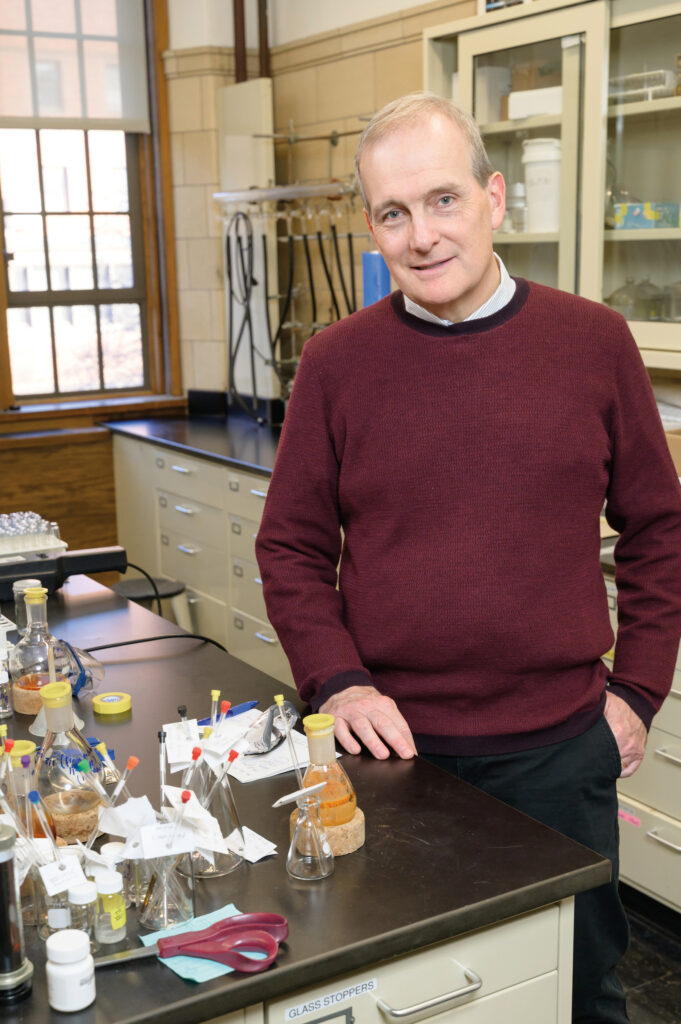Faculty Focus
Tim Curran
Vernon K. Krieble Professor of Chemistry
When Tim Curran was in high school, he got some bad advice. His chemistry teacher said he shouldn’t pursue chemistry in college because he was klutzy in the lab.
“I had dropped and broken a few things,” Curran explains. “Looking back, I just thought it was terrible advice. When you first start riding a bike, you might fall off. You should get back on. You may eventually get good at it.”
Thankfully, for the thousands of students Curran has impacted over his three-decade career in higher education, he ignored his teacher. After majoring in chemistry at the College of the Holy Cross, he earned a Ph.D. in organic chemistry at the Massachusetts Institute of Technology.
Upon receiving his doctorate, Curran worked as a researcher at Harvard Medical School before joining a Boston-based biotech start-up. It didn’t take long, however, for him to find his way to his true calling. 
“I’m a practicing Catholic, and I believe that everyone has a vocation in life, and part of that vocation is trying to help other people,” Curran says. “I thought that I knew quite a bit about chemistry, and I thought I’d be pretty good at sharing that with other people.”
In 1991, Curran returned to Holy Cross, joining the faculty as an assistant professor. He arrived at Trinity College in 2000 and has chaired the Chemistry Department since 2006. Curran’s teaching method, which he describes as Socratic, encourages every student to contribute to discussions. Most of his classes begin by analyzing a chemical reaction and investigating how it occurred. While truth is the objective, other lessons are learned along the way.
“I also make it really important for them to know that it’s OK to be wrong,” Curran says. “In the quest for getting things right, very often scientists are wrong. The ability to recognize that you’re wrong and change course is a really important trait to have in life.”
Curran’s influence looms large for many of his former students who have gone on to pursue careers in research and medicine. Alumna Lauren Davidson Former ’16 notes, “His mentorship shaped my character and the course of my life as he encouraged me to pursue the Fulbright research scholarship in Germany, where I still am eight years later.”
Former, who leads global projects aimed at removing toxic chemicals from water, honed her love for chemistry as a researcher in Curran’s lab. “I was motivated by his passion for the beauty of what we can create with science and how he challenged students to creatively solve puzzles to ‘see’ the molecules behind the data,” she says.
Last fall, Curran won a Career Achievement Award at Trinity’s inaugural Faculty Excellence Awards. “Tim is so deserving of this award,” says Michelle Kovarik, Gregory G. Mario ’87 Professor of Chemistry. “He has been an active researcher who trains students in the laboratory, an exceptional teacher who inspires students to get up at 8:00 a.m. to be in his sections, and a valued member of the community providing leadership and service.”
Alison Draper, director of Trinity’s Center for Interdisciplinary Science, adds, “Tim is always looking out for others––his students, his colleagues, and the College in general. He has built an amazing community within the Chemistry Department of faculty and students who know and support one another and strive for excellence, especially in research.”
Beyond his knowledge and expertise, Curran brings empathy and compassion to his teaching. While these attributes have always been part of his identity, he describes a tragedy that changed the way he works with students. When he was teaching at Holy Cross, he and his wife had a son, Stephen, who passed away shortly after birth.
“I think that was a turning point in my teaching career, that awful thing,” Curran says. “I can’t look at a student and not know that they had to have been loved so very deeply by somebody, and those people are committed to sending their child to Holy Cross or Trinity. Their parents or guardians or whoever wants them to get a good education, and I’m one of the people they’re depending on. I can’t let them down.”
Curran’s first teaching job came as a student at Holy Cross when he volunteered to teach religious education. To prepare for it, he took a mini teaching course with a Jesuit who was overseeing the program.
“His first words have always stuck with me,” Curran says. “ ‘To be a good teacher, you have to love your students. You have to be deeply committed to helping them do well.’ I would say that is probably true for me.”
By Eliott Grover
Photo by Nick Caito
